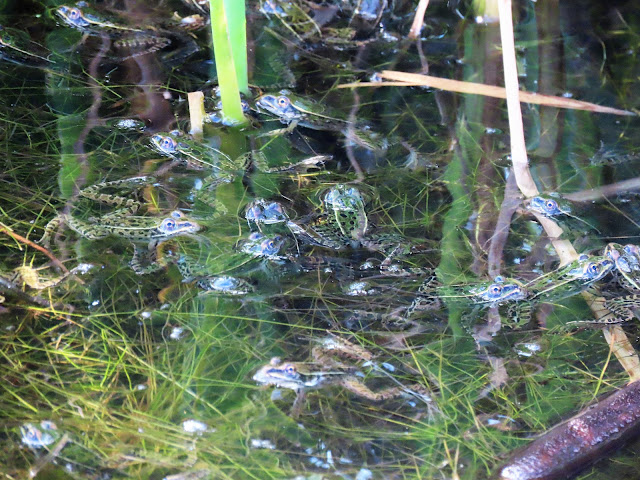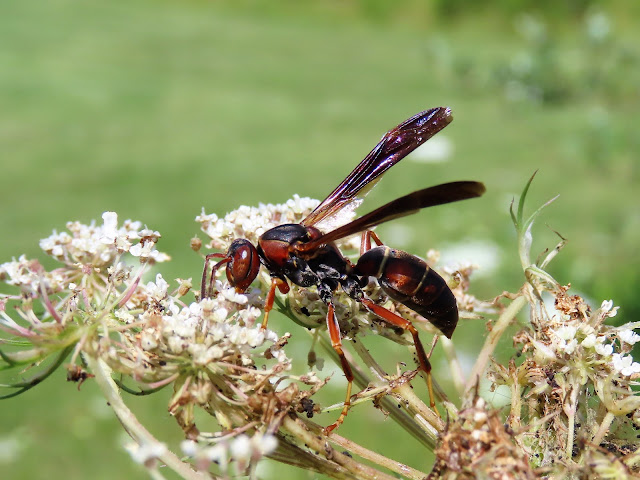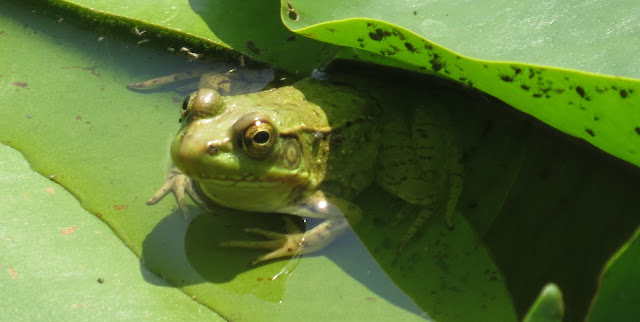21 July 2021
Laurel Creek Conservation Area, Waterloo, ON
We are taking full advantage of the annual pass we bought to permit entry to all the conservation areas administered by the Grand River Conservation Area, and at the same time indulging our passion for nature. To no one's surprise, especially not mine, Miriam is proving to be a proficient and persistent macro photographer.
As indicated when telling of our last foray into Laurel Creek C.A., Northern Leopard Frogs (Lithobates pipiens) give every indication of a very successful year.
I am using not even the slightest hyperbole when I say that they were everywhere we walked, hopping out of our way as we moved, frequently heading for the nearest patch of water.
At a given moment there were hundreds in view.
So often, of late, there has been a litany of despair associated with wildlife populations, so it is encouraging to be able to report success of this magnitude.
There follows a picture of a Slender Spreadwing (Lestes rectangularis), albeit not of exceptional quality.
Paper Wasps (Polistes spp.) are the insects we love to hate, yet they generally do not threaten us unless their nest is under siege.
Dark Paper Wasp (Polistes fuscatus) is a distinctly marked species, and Miriam approached this individual at close range to get her pictures.
Neither Miriam nor the wasp felt at risk from the other, and both went about their business undisturbed.
Common Red Soldier Beetles (Rhagonycha fulva) were not shy about showing the world what they do best!
Unlike the paper wasp above, this Widow Yellowjacket (Vespula vidua) is more aggressive and at times stings without apparent provocation.
Canada Geese (Branta canadensis) are not stingy when it comes to providing fertilizer for all who wish to collect it, often on the soles of your shoes unfortunately!
Some species of dragonfly never seem to land, but Widow Skimmer (Libellula luctuosa) has no such reluctance.
Monarchs (Danaus plexippus) have been seen more frequently of late. This one is perhaps dusted with pollen.
A regular reader of my blog, Elaine, has posed a variety of question regarding birds and their biology and lifestyle and I will start to answer them, two or three at a time in this and subsequent posts.
Q. Do some birds only have one brood per year?
A. Most species at our latitude are single-brooded, especially neotropical migrants like wood warblers, thrushes, flycatchers, hummingbirds etc who are present here for three to four months on average, and do not have sufficient time to raise a second brood. Large birds such as raptors with long incubation periods and prolonged nestling care have only one brood.
Q. Which factors influence how many broods birds have per year?
A. Food availability is generally the most significant factor. In times of abundance more second broods are initiated, but not by the entire population of a species. In a well-studied Barn Swallow (Hirundo rustica) colony, for example, around thirty pairs had successful first nests, a dozen or so laid second clutches. Second broods have higher failure rates across a range of species.
Q. If a bird's nest, eggs or babies are destroyed, what's the impact on their nesting behaviour.
A. If the event occurs early most species will renest. However, if it is late in the cycle, just before nestlings are about to fledge for example, no attempt will be made to renest and the year's breeding attempt will be lost.
22 July 2021
Hillside Park, Waterloo, ON with Heather and Lily
Ebony Jewelwing (Calopteryx maculata) may be found from April through October, but July and August are the peak flight months here in southwestern Ontario.
Ebony Jewelwing ♂
They were abundant at Hillside Park.
Ebony Jewelwing ♀
Lily was of course the star of the show, and here she is being very good in her stroller as her mom looks off at something that caught her eye.
Lily is not always happy to be in the confines of her stroller any more, but today for the most part she was a model of good behaviour.
Green Immigrant Leaf Weevil (Polydrusus formosus) is another invasive pest in the army of species that has arrived here in shipments of fruit or by other means.
It feeds on the leaves and blossoms of many woodland trees, but is also a threat to fruit trees and orchards.
Himalayan Balsam (Impatiens glandulifera) as its very name implies is also invasive, and is an aggressive colonizer, supplanting native species.
All too soon it was time to bid goodbye to Heather and Lily.
26 July 2021
SpruceHaven, St. Agatha, ON
Sanctuary Field is well on its way to becoming the grassland we are all hoping for.
The pond in front of the house is abuzz with activity and I was happy to spot this female Eastern Pondhawk (Erythemis simplicicollis) resting on the broad leaf of a water lily.
The Staghorn Sumach (Rhus typhina) are beginning to send us a message that summer is running away on us and fall is not so far ahead.
Their ostentatious and extravagant fruit clusters will soon pale by comparison with their fiery autumn foliage.
Something to look forward to.


























































How lovely to see the frogs- they seem to be in decline here.
ReplyDeleteMy how Lily has grown, beautiful little one.
ReplyDeleteMiriam is doing extremely well with her macros - well done
If you hold her hand she will walk several steps now, so she will be walking unaided any day now.
DeleteThat green frog is interesting. I don't know if that variety is there in India.
ReplyDeleteGreen Frog is a North American species, Pradeep, but I have no doubt that you have many interesting species in India.
DeleteI'm glad to see that the frogs are thriving, though perhaps it's an indication that something else (either parasite or predator) is doing less well. I enjoy seeing the macro-photography and I suspect it won't be long before Lily is a useful accomplice in this endeavour; small children are better at finding "mini-beasts" than any adult.
ReplyDeleteBeautiful photos, David. The frogs are very handsome.
ReplyDeleteThe fields of gold flowers are very pretty to watch. It's wonderful to see so many of them.
Lily is so cute as always.
Hi David, what a beautiful post, filled with so many wonderful species of wildlife, including the lovely Lily and her beautiful mother! My fave photos today, apart from Lily, were those wonderful frogs, I have never seen so many together. The photos are wonderful, Miriam does a wonderful job with her photography! Have a great day, take care, hugs to you both, Valerie
ReplyDeleteOhh, the frogs from our balcony say "hi!"
ReplyDeleteGreat macro-shots. And so many geese! And the cutest pic of a Goldfinch.
Great Q/A and such a cute girl(s)...
Hello David,
ReplyDeleteYour nature posts and photos are always amazing. I would love seeing hundreds of the Northern Leopard frogs hopping out of the way. Great sightings of the butterflies, dragonfly and the birds. Cute photos of Lily and her Mom. Kudos to Miriam for all her photos. Thank you for linking up and sharing your post. Take care, have a happy weekend! PS, thank you for the comment on my blog.
A los insectos no les importa que los observen ;) David, ello siguen a lo suyo. Variado reportaje. Pero estando Lily, acapara todas las miradas. Está preciosa
ReplyDeleteBuen fin de semana David. Cuidaros.
Un abrazo.
Hi David!!! Fantastic series of great pics... Happy weekend
ReplyDeleteHi David.
ReplyDeleteI see a great series of beautiful things.
Beautiful Frogs, Butterflies, Flowers and Birds.
Nice questions and answers, always nice to learn something.
Lily is a sweetheart, it will be difficult if she really wants to walk.
Thanks David for showing so many beautiful things, it takes a lot of work to get it on the blog.
Greetings from Patricia,
Frogs have a favorable natural environment. Here, only in the ponds near the Danube I saw frogs.
ReplyDeleteHari OM
ReplyDeleteWhat a fangdabbydoozy post today - outstanding images and fun Q&A and then Lily to top it off. Ta yet again! YAM xx
If only you could be a little more enthusiastic!
DeleteHi David - all those frogs ... amazing - just lovely and so pleased to see they're flourishing. Wonderful photos c/o Miriam - she is as you say a consummate photographer ... we're so pleased you share with us.
ReplyDeleteLily is a-growing ... a little person now ... and so pleased Elaine has asked you a few questions - which you're answering for us ...
Continue to enjoy your summer into late summer walks ... thanks for sharing - cheers Hilary
Love the frogs. Great photos.
ReplyDeleteIt looks like the insects pose for you. Such variety too.
Lily continues to win hearts. Such a cutie!
Sometimes they are very cooperative, Marie, but at other times the picture you see is a result of twenty or thirty minutes of stalking.
DeleteAs per usual, a most thorough and impressive tour. And Lily.
ReplyDeleteAnother wonderful post of brilliant nature images. All the pics are gorgeous but the frogs overwhelmed everything else.
ReplyDeleteAll those frogs make me want to ask if you have ever seen Cannery Row? We are being blessed all around with Dragon Flies. They bring such good fortune. Lily is growing like a weed and her smile is filled with happiness.
ReplyDeleteI have read the Steinbeck book but I have never visited the location.
DeleteBrilliant photos. Never seen that many frogs together!
ReplyDeleteLily is very sweet and already waving :)
Hi David, wonderful photos and area, but Lily takes the price👍😊
ReplyDeleteAn enjoyable post with plenty of wonderful photos. Lily is growing so fast. Especially loved the baby bird photo with an attitude look.
ReplyDeleteYes the two last photos of Lily and her mother is just wonderful!
ReplyDeletealso the rest of the pictures!Very nice to see :)))
Many frogs!!The migration of the geese has now started here with me. I hear them all over my bedroom at night. Summer is over!
Thanx for sharing David and Miriam:))
Buenas tardes amigo David, nuevamente precioso reportaje tanto de flora, como de fauna e insectos, acompañado todo ello de tus excelentes explicaciones y bellas imágenes, tendrás que conceder un premio muy meritoso a esa gran fotógrafa que es Miriam.
ReplyDeleteTus respuestas a esas preguntas han sido fenomenales como gran amante y entendido en la materia amigo profesor.
En cuanto a la pequeña Lily, cada día está más guapa y ya es toda una mujercita, su mama tiene que estar sumamente orgullosa.
Un fuerte abrazo querido amigo y compadre y buen fin de semana.
Lovely pictures as always. I especially like the frogs and the American Goldfinch in its summer colors. They are always much duller when we see them in the winter.
ReplyDeleteIl y'a beaucoup de grenouilles! La guêpe à papier est très jolie, les photos sont belles.
ReplyDeleteLily voudra bientôt marcher au lieu d'être dans la poussette, mais sera sans doute vite fatiguée.
Bon weekend
You are right. We would soon have to pick her up and carry her.
DeleteLily is a sweetheart! And it's neat to see so many frogs and geese. We saw quite a few Canada Geese on our trip but never where we could stop and get photos.
ReplyDeleteTo have seen the Northern Leopard Frog in such large numbers would have been thrilling. It would seem that your summer is now in full swing with its blue skies, amazing insects, warbling birds and thriving grasslands. Wonderful!
ReplyDeleteI am really enjoying your posts with the mixture of insects, birds and whatever else might appear. I have never seen so many frogs wow. Interesting set of questions being answered as well. information for all of us. keep safe, best wishes to you both. Diane
ReplyDeleteMiło patrzeć, jak dziewczynka rośnie! Wszystkiego dobrego dla niej i jej rodziców!
ReplyDeleteGratuluję kolejnych obserwacji ptaków. Ale żaby są dla mnie w tym poście faworytami! Piękne zdjęcia i piękne żabki!
Canada geese always seem to strut around like they own the place.
ReplyDeleteOtra variada entrada que me encanta, todo me gusta. Lily se ve feliz. Abrazos.
ReplyDeleteThat's a lot of Leopard Frogs! I also prefer the things that sit still for a picture.
ReplyDeleteAnother great week, even the plethora of frogs.
ReplyDeleteMagnificent close-up photos (kudos to Miriam). The frogs in abundance are a wonderful sight, as is sweet little Lily!
ReplyDeleteHi David,
ReplyDeleteA great abundancy of all kinds of animals you show us here. Miriam obviously had a great time photographing them. What a number of frogs you have seen. Frogs are quite common with us, but I don't remember having seen them in such numers. Dragonflies, butterflies, it is their season. Every year I hope to see them in large amounts, but unfortunately with us it hasn't been a good year so far with us.
You certainly live in an atttractive area.
Greetings, Kees
hello David
ReplyDeletethe thing with the frogs is sometimes just as everywhere on the paths they can be found but sometimes when you look for them you can't find any, you just hear them ...
Greetings Frank
Thanks so much for taking time to share your birds and nature at its finest with us at IRBB this weekend. Of course, you know by now I really enjoy seeing little Lily!!!
ReplyDeleteThat jewelwing is a new one for me.
I think that Lily has a following around the world!
DeleteWhat a nice selection of critters!
ReplyDeleteWe've two large leopard frogs in the goldfish pond, as well as a green frog. It's a busy spot.
Hooray for Lily!
...I was in the Adirondacks this past week and at a park the there must have been a few hundred Canada Geese. After walking around I'm glad that cows don't fly! Beautiful images my friend.
ReplyDeleteHats off to Miriam's photography. Those macro shots are fantastic, especially the frogs and the butterflies. Insects can be so hard! Well done. Lots of wonderful sightings but one of the favorites is Lily, who is bigger and with more personality in every photo shoot!
ReplyDeleteI have frog envy! I've been trying for three years or more to find a frog, and have had no success -- apart from one bullfrog. I hear plenty of croaks and lots of splooshes, but I've yet to see a frog. Part of it's that I spend so much time around salt or brackish water, I suppose, but even where there are fresh water ponds I can't see them. From the sightings on iNaturalist, it's clear there's no shortage. I need to improve my frog-o-vision!
ReplyDeleteWhat an abundance of frogs. Lovely to see them when they are in decline in much of the world - not in my garden though, I'm pleased to say.
ReplyDeleteMuchas gracias por vuestro apoyo queridos amigos.
ReplyDeleteUn fuerte abrazo de vuestro compadre y amigo Juan.
what a marvel to see all those frogs. But I guess a problem would be not to step on them :) I never see frogs where I live. It seems not to be suitable for them.
ReplyDeleteHow nice to see and have them on your arm, the Ebony Jewelwing. I finally saw a male this week, the ony one I´ve seen this summer. :( The other one, the banded one I have seen 3 males, no femals.
And the Canadageese, I have only seen a few and there usually are a lot.
Take care of your wildlife.
You have so many fabulous photos. I am glad to see so many frogs. The numbers in my yard this year are down, but perhaps because a pair of broadwing hawks are nesting just off in the woods. I'm not sure if they eat frogs, but you would probably know. It sure has brought down the number of chipmunks. Your bird photos are beautiful also. Glad you can make the most of the summer and some outside places. Happy August David.
ReplyDeleteIt's a very interesting observation you make, Erika. Amphibians do comprise a substantial part of the diet of Broad-winged Hawks, and their relatively late arrival in spring is geared to the emergence of amphibians from hibernation.
DeleteYour observation is interesting, Erika. Amphibians are an important part of the diet of Broad-winged Hawks and their fairly late arrival in spring is timed to take advantage of amphibians emerging from hibernation,
DeleteHoi David, prachtige serie fotos. Van de kikkers, insecten, vogels en natuurlijk Lily. Heeft ze ook nog een mini verrekijker?
ReplyDeleteNot yet, Caroline, but give it a couple of years!
DeleteGood to hear the frogs are thriving, they're quite beautiful aren't they. Miriam's photos are great, especially the Paper Wasp!
ReplyDeleteAn outstanding post in all respects!
ReplyDeleteWe're already looking forward to your breeding birds gracing us with their presence in the fall. Our world is filled with so much beauty. Thank you for sharing a bit of it with us all.
Hope your new week is filled with peace. (And birds, insects, blooms ...)
Idyllic setting, I would enjoy this area. I have never seen those Northern Leopard Frogs before with their fascinating markings. Enjoyed seeing a different kind of dragon fly in your Slender Spreadwing and thoroughly enjoyed seeing these and all the other nature’s bounty. The star obviously is Lily and her Mom. Sweet and adorable family you have there.
ReplyDeleteQuerido amigo David, no sé si puedes ver mis entradas parece que hay algún problema, varios amigos de otros blog entre ellos nuestro amigo Juan ,Margaret y seguro que hay más no las pueden ver. Espero tu respuesta me parece raro no verte por mi blog. Un abrazo.
ReplyDeleteI have no idea what is happening, Teresa. I follow your blog and leave comments regularly.
DeleteThanks for a walk through a wonderful area.
ReplyDeleteSweet Lily are lucky to meet nature on a recurring basis.
is... I do not look double
DeleteWow! What a wonderful array of photographs, all so good, I did enjoy them.
ReplyDeleteI am so pleased that you include Lily and Heather in your posts, it is lovely to see the photographs. Isn't Lily progressing and growing well, her lovely smile and wave ... just wonderful.
Happy August Wishes.
All the best Jan
Miriam's photos and your words present us with a delightful picture of a beautifully broad spectrum of the wonderful nature that surrounds you, David. I've thoroughly enjoyed this post. However, Lindsay would have nightmares about those frogs - just one is enough to throw her into a panic!
ReplyDeleteA great post with all those frogs pics, which of course we favor, and the dragonflies and the lovely Miss Lily and her mom. I am not a fan of wasps in any form and they would not be included in any photo opp, but thanks to Miriam for her cautious diligence in capturing them.
ReplyDeleteIt's probably true to say that no one, save perhaps for an entomologist specializing in wasps, is a fan of them!
DeleteBellas fotografías te mando un beso
ReplyDelete